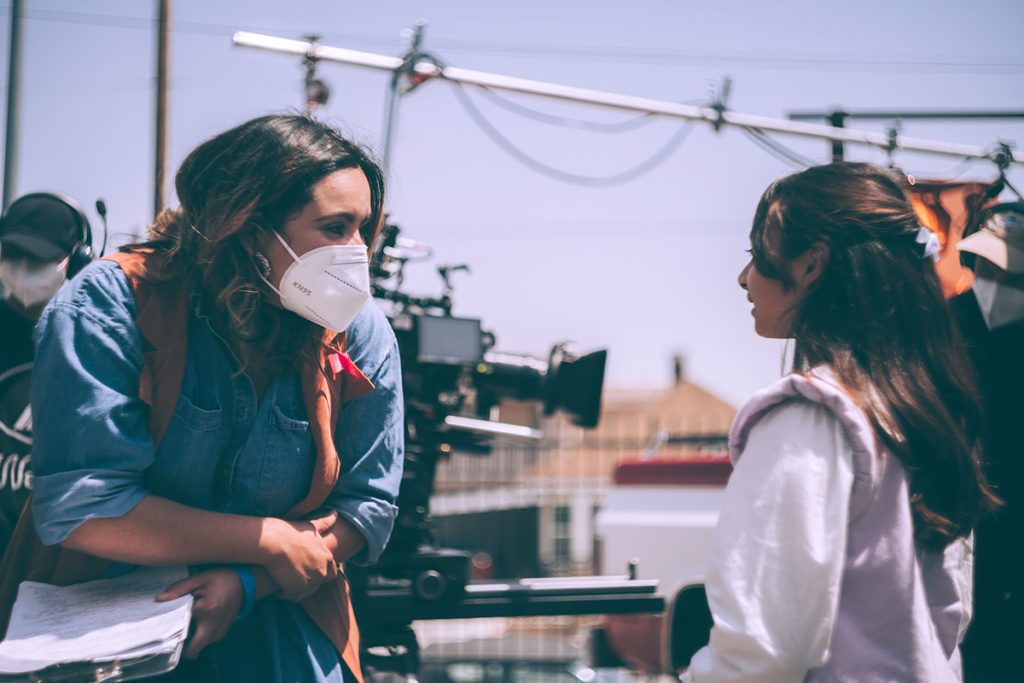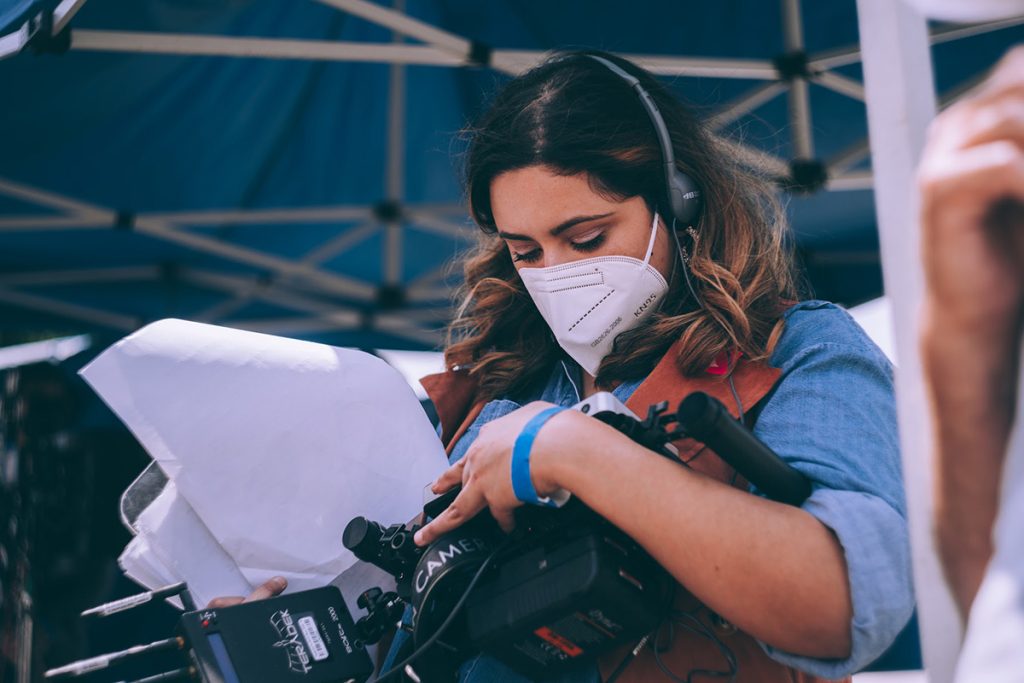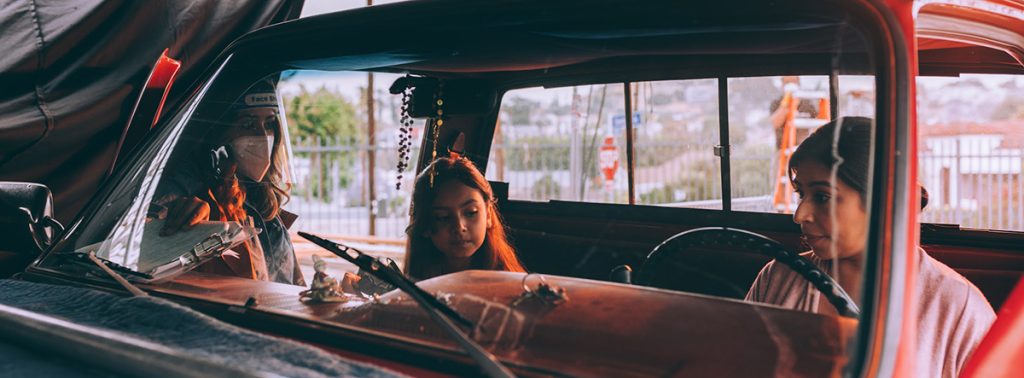IN WONDERLAND Review Excerpt: How do you explain loss to a child? It’s a delicate matter, especially for children seeking asylum. Writer and director Andrea Camacho McCracken explores this challenging question in her short film, IN WONDERLAND” which showed at the 2023 New York Latino Film Festival. Click link for review.
J Perez: Your work seems to have a magical, surrealist quality so I was surprised to learn that you started out as a math major and felt like you had to work to rebalance the left and right side of your brain. When I’m viewing your work, I’m like, ‘This is clearly somebody who is incredibly creative.’ What’s that journey been like, that rebalancing act from the left to right side of your brain?
Director Andrea Camacho McCracken: Honestly, growing up, I was very much academically focused, a reflection of my experiences as a first- generation Latina. Sometimes you feel like you have to choose the path that is financially more stable, and you are just programmed in that way. I feel like I was always creative, I just didn’t think that it was a path for me to take, or, I didn’t have the resources to really understand the opportunities that were out there for someone who wanted to or was prone to telling stories.
I remember going into class, always choosing the creative option if there was a choice between writing a five-page essay or writing a creative story based off of the chapter, I always chose creative.
I feel like creativity has always been driving me, I just didn’t really know how to define that and see it as a future for myself. When I went to college, I graduated valedictorian because, again, I was very much academically-driven. That’s where I felt my strengths were, and so there was no question about it; I have to go into some type of major that I could really take advantage of those strengths. I first went into architecture because I thought, I can do art and math – In my brain, I thought that meant architecture. But when I started taking some classes, I literally only lasted half a semester because I realized I couldn’t draw. So, I thought to myself, “This is definitely not it.”
I quickly switched to math because I felt like I’m familiar with it, I’m comfortable with it. It just was something I could do while I figured out what was next, but I always loved film.
Growing up, I was at the movies twice a week because my mom also enjoyed the movies. On her days off, she would take me and my little brother to the movies. It was just something common for me. I didn’t know that most people didn’t love movies as much as I did. I just felt this was normal. I took this film elective, and that’s really where I met the people that felt the same way, had the same passion, had the same dreams, and I just felt like I found what I needed to find.
It was in that elective that I found out about the film program at ASU. At the time I went to Arizona State University for my undergrad. I applied to the program and then from there, it was just an intuitive choice that I had to make, and I made the switch {from math to film} there. Being creative has always been a part of me, but I do have a very logical brain and I think that’s also served me as a producer in video production or commercial production because there’s so much of that logical sense that you have to have to really gather crew together, look at budgets, really negotiate for certain locations or contracts or whatever it is. So, I feel like both sides of my brain have helped me become a whole filmmaker.
Perez: Absolutely. And to your point about always being creative, but being first generation, the idea of creativity as a career path feeling like not an option, or at least an obvious option, that’s so real. Maybe that leads us into your production company, Mad Girl Films?
Director Andrea Camacho McCracken: Mad Girl films came out of my other production company that I was running. This was probably now two years or three years ago. I was doing video production, film production, and commercial work but I wanted to have another branch where I could use the same resources and equipment to produce films that I wanted to make, that were less about profit. Mad Girl Films came out of a desire to work with new people and be more experimental. I also wanted a way to to brand my films. I remember coming up with Mad Girl Films because I just felt like, and I don’t know if this makes any sense anymore because this was a while ago, but it was the word “mad” and being a woman and being a Latina.
It always has this negative connotation when you have something to say, and maybe you are angry, maybe you are confused, maybe you are questioning things. Sometimes there is a negative connotation if you are kind of pushing something that shouldn’t be pushed or questioning something that shouldn’t be questioned. I think that’s why I chose “mad” because there were some things that I was mad about, the biases of the industry or the stereotypes that you see in film.
I think I wanted to really take a stab at telling stories that weren’t stereotyped. Stories that came from an authentic voice and were portrayed by authentic talent.
The films that I’m in, I think there’s only three. In Wonderland I directed under my grad program. That wasn’t necessarily a production from Mad Girl, but the other few were. I think regardless of it being branded under Mad Girl; I think that’s really my identity as a filmmaker. I use genre to really turn things around for our stories and other stories that are not being told in an authentic way, but using genre I can do something interesting or surprise people by telling something a different way.
Perez: I think that your desire to tell authentic stories from within the Latinx community comes through in “In Wonderland”. The film was based off of a story that your father told you, is that correct?
Director Andrea Camacho McCracken: Yeah.
Perez: I think border crossing stories are very specific to immigrants, but I feel like within the Mexican American community, the Latinx community, those stories become very close to our families and therefore are deeply personal. In IN WONDERLAND, you took something deeply personal like a story about crossing the U.S-Mexico border and combined it with Alice in Wonderland. That is such an interesting connection. As I said in the beginning, I feel like so much of your work feels magical and surreal, could you talk a little bit about how border crossing and Alice in Wonderland connected for you?
Director Andrea Camacho McCracken: Like you said, I was inspired by my fathers story of crossing into Arizona from Nogales, Mexico, like Sonora … I remember being told these stories more than once, when I was maybe 12. They were always told in a very casual, nonchalant way of, ‘Oh, yeah. I remember going into a sewer and there were big rats.’ It never left my memory, or my brain and it has always just been kind of a nugget in the back of my mind.
When I was trying to figure out what story I wanted to tell as my graduating film at AFI, I was thinking deep. I knew I wanted to, again, use the same kind of tool, whether it’s magical realism or whether it’s surreal elements. I wanted to do something in that vein, but I also wanted it to feel topical, and I wanted it to really move {people} and say something that mattered to me.
Like you said, crossing the border and the immigrant experience resonates a lot with our community because … I mean, I grew up in Arizona. We’re at the border of Mexico, and same thing with California. There’s a huge population of Latinx, specifically Mexican Americans in California as well. I felt like it was a story that I needed to tell, especially because we were going to be given resources at school. I wanted to go as much out as I could because this could be my shot at trying to make something really, really captivating.
I’ve always loved Alice in Wonderland, and I thought it was such… When I was thinking about, “Okay, how can I make this story, of a little girl and her father, crossing the border?” It was almost like I thought about that as a piece.
I didn’t have the whole story until I realized that Alice in Wonderland was the device I was going to use. Alice falling down the rabbit hole metaphorically made so much sense to how children are thrown into the system, and then separated from their families, how that could feel like you’re just falling down this rabbit hole and landing in Wonderland, which is this very confusing adult world that makes no sense. I thought, these kids coming into this country probably have no fucking clue what’s going on or why they can’t go back home. They probably don’t even understand the scope of why they’re there and why was this worth it?
Why was this Wonderland if back home was home and they had family and they had cousins and they had … there was so much … that just unraveled for me. I just knew that it was the right device and the right story to combine with Nina’s story and the story of her traveling into the United States. It just made sense. I don’t know, sometimes that happens where you have no clue why things land on your lap, and everything just connects, and it just makes the story stronger. I was just really lucky to have found that connection between Alice and Nina’s story.
Perez: I think the choice to combine those two stories was so wise because it creates a space to go through this journey with Nina, while also becoming aware of what has happened. It’s a deeply tragic and sorrowful experience but we get to experience so much beauty and richness because of the way Alice in Wonderland is combined with crossing the border. It was very beautiful. I don’t want to take up too much more of your time, but I have a few more questions.
Director Andrea Camacho McCracken: There’s no rush on my end.
Perez: Okay, great. I thought that the way you played with audio in IN WONDERLAND, particularly the court room scene, was very unique. I also thought that way the way you used music in WHERE DO YOU GO? There was a song from “Suicide,” which isn’t the most well-known group, then I saw that your mother was a radio DJ and your dad used to play the radio so that you could hear her voice as well as his own music all the time. I was wondering how does sound fit into the way that you build out your stories? It feels, as an audience member, very personal.
Director Andrea Camacho McCracken: Yeah, that’s so funny that … It is. I love sound design. Whenever I start writing a script, I think in sound. I can’t put together a story if I don’t know what sounds are motivating things. It’s such a visceral sense. I’m sure you’ve heard this before, but a lot of film professors have always said the audience will forgive picture, but 80% of {a film} is sound and the audience will never forgive sound if it’s really low-quality.
There’s so much power in that, knowing that sound holds so much weight in a film. Because sound is such a visceral experience to be in a room with all of your attention towards the screen, but your ears are focusing on… everything, sound almost transcends everything. I grew up always having music on because my mom was on the radio and my dad would work during the day and my mom would work during the evenings through the night. Every evening, we’d just hang out in the living room with the radio on. Music has always been something that connected my mom, me, and my dad.

WONDERLAND Director Andrea Camacho McCracken with actress Elizabeth Phoenix Caro who plays Nina. Picture by Yukun (Steven) Chan
We just love it. My brother too. It’s just a part of us. I think that’s why, when I put together stories, if I’m not thinking about that part, I can’t really see the character. There’s so much about music that adds to the tone of a film and the feeling of a film, and I think sounds themselves could be designed so that they feel like music.
The courtroom scene in “In Wonderland”, – I definitely wanted it to feel like she’s super isolated and alone and confused and almost like the judge is really, really far away. Even {Nina} just not knowing the language, there’s this distance that she has, this disconnection that she has to what’s happening. I thought headphones are so common for translators and thought about of these huge headphones on this tiny girl.
What are the sounds? How can we elevate the feeling of anxiety for the audience so that they feel like they’re in her shoes? That was a really fun scene to put together. I had to workshop it for a class in school, so I feel like I had more time with that scene. I was able to think about how to design it visually, but also auditorily. I’m so happy that it resonated with you. I think that’s my favorite scene because I had the most time with it.
I love sound. And like I said, that’s sometimes the first thing I think about when writing a scene. What’s the sound that we hear in this room right now?
Perez: The scene did take the audience right where they were supposed to be, and then it held them there throughout the duration of the film. I really appreciate you taking some extra time with me today. Is there anything you’d like to add? Do you have any upcoming projects that you want to shout out?
Director Andrea Camacho McCracken: Well, thank you for your time. I’m really excited right now. I’m currently developing the feature for this (IN WONDERLAND), and I feel like it’s just going to be so much more magical I wanted to add a bit more of the magical connections between Alice and Nina, but because of it being a short, we had to choose the strongest device and that was the rabbit hole.
But there’s so much that I want to play with when it comes to other really iconic characters from Alice and Wonderland and the characters in Nina’s life. Nina and Carmen, we’re definitely going to develop their relationship a bit more because I do feel like Carmen’s experience and perspective is also super unique and should be explored, we just didn’t have the time. Carmen is also struggling in this country and now suddenly she’s given a little girl who is coming to her with trauma, pain and grief. They’re grieving together, I think that’s going to be really, really awesome to put on screen. Hopefully this feature turns out.
Thank you for giving me your time to talk about In Wonderland, and I’m so happy to hear that it connected. It just pushes me to keep writing and finish this feature because there seems to be some heart that is really resonating with everyone, and that makes me so happy. So, thank you.
Perez: Thank you. I will keep my eyes open for IN WONDERLAND as a feature film. That’s very exciting.
J Perez can be reached at z3phouseestablishment@gmail.com


